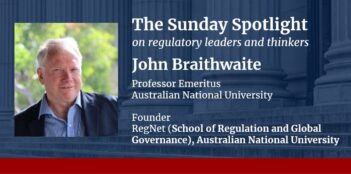
Report proposes regulatory solutions to redress economic harms faced by individuals with criminal records.
Nearly one in three adults in the United States has a criminal record. Individuals with criminal records endure significant consequences related to their ability to acquire employment, housing, and education. Previously incarcerated individuals suffer an average 52 percent loss in earnings.
In a report issued by the Center for American Progress, Christian E. Weller, Akua Amaning, and Rebecca Vallas argue that the criminal justice system deepens the racial wealth gap in the United States. To combat the pervasive negative effects of the system, Weller, Amaning, and Vallas propose a series of criminal justice reforms at both state and federal levels.
At present, the existing criminal justice system disproportionately punishes Black and Hispanic individuals. As a result, Black and Hispanic families with an incarcerated family member maintain significantly less wealth than families without an incarcerated family member—or even white families with an incarcerated family member. The average wealth held by a Black family with an incarcerated family member is less than $4,000. In contrast, the average wealth of a white family with an incarcerated family member is over $50,000.
Weller, Amaning, and Vallas emphasize the far-reaching consequences of criminal records on future economic prospects, and propose that states and the federal government prioritize record-clearing initiatives. Although most states institute some form of record clearing through expungement or sealed records, the financial costs associated with these options often prevent individuals from pursuing these avenues.
Without access to such “clean slate” programs, previously incarcerated individuals face greater difficulties securing employment, housing, and education. Weller, Amaning, and Vallas argue that the federal government should supplement state governments with financial resources to enact wide-reaching record-clearing policies.
To illustrate one of their proposed reforms, Weller, Amaning, and Vallas cite the Fresh Start Act, introduced in the most recent congressional session. This bill would allocate federal funding to state governments to bolster and maintain record clearance programs. If implemented, the federal government could deny funding to any states requiring prohibitive fees for record-clearing processes. In a similar vein, the proposed Federal Clean Slate Act would create the first federal record-clearing system to address federal convictions.
Another financial barrier created by the criminal justice system stems from court-mandated fines, which often serve purely punitive purposes, contend Weller, Amaning, and Vallas. If previously incarcerated individuals cannot pay fees prescribed by judges, they might be forced to return to jail. Furthermore, for those pursuing record-clearing, any outstanding fines could disqualify them from achieving a clean slate. To combat the harmful impacts of this process, Weller, Amaning, and Vallas urge states and the federal government to abolish unnecessary fines and court fees.
Weller, Amaning, and Vallas focus their final policy recommendations on barriers to access—specifically, those involving employment, housing, education, and government assistance opportunities.
Reliable employment remains a significant barrier for previously incarcerated individuals. Because most jobs require some form of background check, applicants with criminal records are 60 percent less likely to earn an interview. To redress this disparity, Weller, Amaning, and Vallas recommend the widespread adoption of fair-chance hiring standards. For example, ban-the-box policies restrict employers from asking applicants about previous criminal history prior to making an employment offer.
The prevalence of background checks raises another issue in the realm of housing equity and education, argue Weller, Amaning, and Vallas. In the context of housing, the majority of landlords use background checks for housing applications. As a result, individuals with criminal records suffer from insecure and unstable housing stemming from experiencing discrimination at higher rates.
These statistics, coupled with the ongoing dearth of affordable housing, should prompt action from regulators, Weller, Amaning, and Vallas argue. Specifically, they propose that municipalities adopt policies restricting landlords’ ability to conduct background checks or inquire about previous criminal records.
Weller, Amaning, and Vallas also explain that individuals with criminal records encounter hardships when applying to colleges or trying to obtain state-provided financial aid. To overcome barriers to education and the many opportunities that come with it, Weller, Amaning, and Vallas suggest that the U.S. Department of Education re-adopt the Obama Administration’s Fair Chance Higher Education Pledge, which created institutionalized support for students with criminal records in the form of educational grants and career resources.
State and federal governments should also embed institutionalized support into income assistance programs, Weller, Amaning, and Vallas maintain. They contend that lawmakers should amend programs, such as the federal Supplemental Security Income program, to expand asset limits that have remained unchanged over the past forty years. If asset limits increased, previously incarcerated individuals participating in such programs could increase their savings capabilities.
The current criminal justice system continues to perpetuate cycles of poverty and racial discrimination, Welling, Amaning, and Vallas conclude. To close the racial wealth gap and promote equitable outcomes, they urge lawmakers at the local, state, and federal level to break down existing barriers for individuals with criminal records by enacting intentional and far-reaching reforms.



